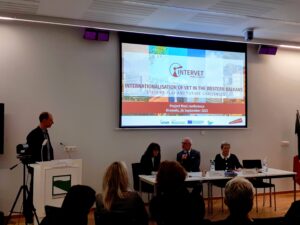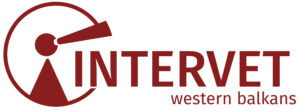The EU Erasmus+ Capacity Building Project: Intervet WB – Internationalization Of Vocational Education And Training Systems In the Western Balkans – has reached its zenith with a final conference that not only applauds its achievements but also highlights the pivotal role of vocational education and training (VET) in fostering collaboration between the European Union (EU) and Western Balkan (WB) countries.
Partners from Western Balkan countries Albania, Serbia, Montenegro, Kosovo, North Macedonia, Bosnia & Herzegovina participated in this capacity building project with EU partners from Spain, Poland, Italy, Slovenia, France, the Netherlands and MCAST in Malta.
The project, detailed comprehensively on its official website (https://intervetwb.net/project/), was a collaborative effort aimed at enhancing vocational education and training in across the Western Balkans. It sought to create sustainable partnerships between educational institutions in the region and their counterparts in the EU.

Central to the project’s success is its emphasis on international mobility—a cornerstone in the development of vocational skills. By facilitating the exchange of knowledge, expertise, and practical experiences, Intervet WB has played a crucial role in narrowing the skills gap and harmonizing vocational training standards between the EU and Western Balkan countries.
The final conference served as a platform to commend the tangible outcomes of the project. Stakeholders, project partners, and experts gathered to reflect on the journey, discuss the impact of the collaborative efforts, and advocate for the continued importance of VET in shaping the future of the vocational training sector.
One of the standout achievements of the project has been the establishment of a robust framework for collaborative vocational training initiatives. Through shared resources and expertise, participating institutions have elevated the standards of vocational education and training in the Western Balkans, ensuring that graduates are equipped with the skills and knowledge demanded by the evolving industry.
International mobility, especially in the realm of vocational education and training, is not just about sharing knowledge; it’s about building bridges between cultures and fostering a sense of community among professionals. The collaborative efforts of Intervet WB have not only enhanced the technical skills of participants but have also nurtured a spirit of cross-cultural understanding and cooperation.
As we celebrate the success of the Intervet WB project, it is crucial to recognize the enduring impact it will have on vocational education and training in the Western Balkans. The strengthened partnerships, shared resources, and elevated training programs will contribute significantly to the region’s workforce development and economic growth.
Moreover, the project stands as a testament to the transformative power of international collaboration in addressing common challenges and creating opportunities for mutual advancement. In an era where the demand for skilled professionals transcends borders, initiatives like Intervet WB are instrumental in shaping a workforce that is adaptable, innovative, and globally competitive.
In conclusion, the final conference of the Intervet WB project not only marks the culmination of a successful collaboration but also champions the cause of vocational education and training across borders. As we commend the project’s achievements, let us also recognize the enduring impact of VET in shaping the future of the vocational training sector and empowering individuals to thrive in an increasingly interconnected world.









 MCAST Main Campus
MCAST Main Campus  +356 2398 7100
+356 2398 7100
 information@mcast.edu.mt
information@mcast.edu.mt